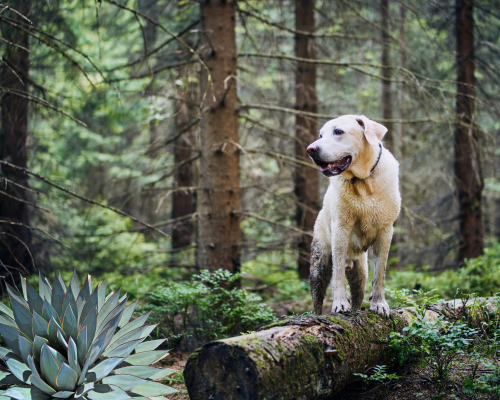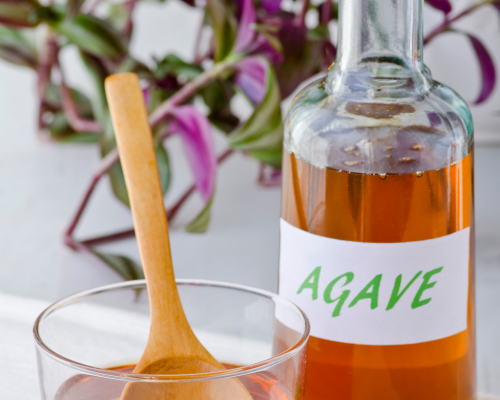Can Dogs Eat Agave Nectar? Vet Checked!
Can Dogs Eat Agave Nectar? Vet Checked!

Vet Reviewed

By: Sarah Hodgson
November 5, 2023
- Posted in Can Dogs EatDogs
Table of Contents
Nowadays there are many different sweeteners to sweeten up both our foods and drinks. Agave nectar is one of those sweeteners. Perhaps you've used it before. Is it safe to share food with this sweetener to dogs?
In this post, we will explore whether it is safe for dogs to eat agave nectar (syrup) and the benefits, and risks that come along with it.
Let's dive in!
What is Agave Nectar?
Let's first go over what exactly Agave Nectar is for those of you who might not be as familiar.
Agave nectar, also known as agave syrup, is a sweetener commercially produced from several species of agave, including Agave tequilana (blue agave) and Agave salmiana. Agave nectar has a relatively low glycemic index, which in readable English means it doesn't cause a rapid rise in blood sugar levels like some other sweeteners. This makes it a popular choice for people looking for natural sweetening options.
However, just because it's a healthier option for humans doesn't necessarily mean it's a healthier option or better yet even suitable for dogs.
Agave Plant Picture:

What Is Agave Nectar Made Of?
To understand this sweetener better let's go over what exactly it contains in terms of nutritional content.
- Fructose: Agave nectar has a high fructose content, making it sweeter than sugar. While fructose is a natural sugar found in fruits, it's important to note that too much fructose can be harmful to dogs.
- Glucose: This is another type of sugar found in agave nectar. Glucose is easily digestible and provides quick energy, but it can also lead to weight gain and other health problems if consumed excessively.
- Saponins: These are naturally occurring compounds found in many plants, including agave. While saponins have some health benefits, they can also cause gastrointestinal problems in dogs if consumed in large amounts.
The nutritional information for a tablespoon (approximately 21 grams) of agave nectar can vary slightly depending on the brand and processing, but here's a general idea:
- Calories: Approximately 64 calories
- Total Carbohydrates: About 16-17 grams
- Sugars: Approximately 16-17 grams
- Fiber: Negligible (almost 0 grams)
- Fat: Negligible (almost 0 grams)
- Protein: Negligible (almost 0 grams)
Note
Agave nectar is primarily composed of sugars, with fructose being the main type of sugar that we discussed above. Even though it's known to be a healthier sweetener it is still high in sugar and calories. It has a lower glycemic index compared to table sugar, which means it may have a milder impact on blood sugar levels.
Can Dogs Eat Agave Nectar?
Yes, dogs can eat Agave Nectar however, there are some setbacks.
Yes, dogs can eat agave nectar. However, it should be given in moderation. While agave nectar isn't toxic to dogs, its high sugar content which can lead to health issues if consumed excessively.
Dogs can eat Agave nectar but giving them this nectar too often can cause problems. It's best not to give it to dogs however, it is safe to feed it to them every once in a while.

Are There Benefits To Feeding Agave Nectar To Dogs?
Agave nectar is just a sweet treat, it doesn't offer health benefits to dogs besides calories and some fiber.
It is a good source of dietary fiber, which can help regulate your dog's digestive system. The saponins found in agave nectar also have anti-inflammatory and immune-boosting properties, which can be beneficial to dogs with certain health conditions.
However, it's worth noting that these benefits can also be obtained from other, safer sources. Therefore, while agave nectar can be a nice treat for your dog, it should stay that way.
Are There Risks To Feeding Agave Nectar To Dogs?
Despite the potential benefits, unfortunately, there are more risks than benefits associated with feeding agave nectar to dogs.
- High Sugar Content: Agave nectar is primarily composed of sugars, primarily fructose. Dogs do not have the same sugar metabolism as humans, and excessive sugar consumption can lead to various health issues, including obesity, dental problems, and potential complications like diabetes.
- Unnecessary Calories: Agave nectar is calorie-dense, and providing it to your dog can lead to weight gain if not balanced with their overall dietary needs.
- Risk of Agave Poisoning: As mentioned earlier, certain species of agave plants can be toxic to dogs. Feeding agave nectar may inadvertently introduce them to the potential risk of agave poisoning if the nectar is derived from toxic agave plants.
- Lack of Nutritional Value: Agave nectar does not offer any essential nutrients that dogs need for their well-being. It lacks protein, vitamins, and minerals that are crucial for their health.

Can Dogs Get Agave Poisoning?
While agave nectar isn't toxic to dogs, and they can have it as we answered above consuming too much can lead to a condition known as agave poisoning.
Also, some species of agave contain compounds that can be toxic to dogs. The primary toxic substance in these plants is saponins, which can cause gastrointestinal and other health issues in dogs.
Symptoms of Agave Poisoning In Dogs Include:
- Gastrointestinal upset: Vomiting and diarrhea are common symptoms, and they may be accompanied by blood in the stool or vomit.
- Drooling: Dogs may excessively salivate and paw at their mouth due to irritation.
- Abdominal pain: Signs of abdominal discomfort may be apparent.
- Loss of appetite: Dogs may refuse to eat or drink.
- Lethargy: The dog may appear weak and lack energy.
In severe cases, there can be more serious symptoms, including heart arrhythmias, muscle tremors, and even kidney or liver damage.
To Prevent Agave Poisoning In Dogs
- Keep agave plants out of your dog's reach in your yard or garden.
- Be cautious when handling agave plants to prevent sap or leaves from coming into contact with your pet.
- Educate yourself about the types of agave plants in your area and their potential toxicity to dogs.
Alternatives to Agave Nectar for Dogs
If you're looking for a healthier sweetener for your dog, there are several alternatives to agave nectar that contain much more nutritional content than agave.
- Honey: Honey is a natural sweetener that can be given to dogs in moderation. It has some potential health benefits, such as antibacterial and antioxidant properties. Ensure that the honey is pure and does not contain any added sugars or artificial ingredients.
- Applesauce: Unsweetened applesauce can be used as a natural sweetener in dog treats or added to their meals. It's a good source of dietary fiber and vitamins.
- Bananas: Mashed bananas are naturally sweet and can be mixed into your dog's food as a sweet and nutritious addition. Bananas are a good source of potassium and dietary fiber.
- Pumpkin Puree: Unsweetened pumpkin puree is another option that can add a touch of sweetness to your dog's meals. It's high in fiber and contains essential nutrients.
- Yogurt: Plain, unsweetened yogurt can be used to provide a creamy and slightly tangy flavor to your dog's treats or meals. It also offers probiotics that can be beneficial for their digestive health.
- Carrots: Some dogs enjoy the natural sweetness of carrots, and they can be used as a healthy and low-calorie treat.
- Berries: Certain berries, like blueberries and strawberries, are naturally sweet and can be given to dogs as an occasional treat. They are also rich in antioxidants.

The Bottom Line
So there you have it, while dogs can eat agave nectar, it's important to do so in moderation. The potential health risks associated with its high sugar content make it a treat that should be given sparingly.
Your dog's health and happiness are always worth the extra effort! Sweeteners like honey and maple syrup are much better than agave.
Stay sweet!
Frequently Asked Questions
What Is Agave Poisoning in Dogs?
Agave poisoning in dogs occurs when a dog ingests parts of certain agave plants, which can be toxic to them. The severity of agave poisoning can vary depending on the specific species of agave and the amount ingested.
Can dogs get agave poisoning?
Yes, consuming too much agave nectar can lead to agave poisoning. Symptoms include vomiting, diarrhea, lethargy, and abdominal pain.

Subscribe to Petfluence!
Get updates on the latest posts and more from Petfluence straight to your inbox.